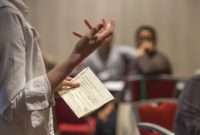Public speaking is often one of the most daunting experiences for many, yet it’s an essential skill in both professional and personal life. The ability to speak with confidence can open doors to countless opportunities, from career advancements to networking events. But how can you develop the self-confidence necessary for effective public speaking. The answer lies in understanding that confidence comes from preparation, mindset, and practice. With these elements in place, anyone can overcome their fears and excel in front of an audience.

Building self-confidence for effective public speaking requires a combination of mental and physical strategies. The more prepared and comfortable you are with your content and delivery, the more confident you will feel. Whether you’re addressing a small group or an auditorium full of people, practicing self-confidence techniques can help you speak with authority, clarity, and impact. In this article, we will explore practical tips to help you boost your self-confidence and ensure your public speaking performances are successful.
Prepare Thoroughly for Your Speech
Research and Organize Your Content
One of the most effective ways to build self-confidence for effective public speaking is to prepare thoroughly. It’s essential to know your material inside and out. Research your topic thoroughly, ensuring you understand it well enough to speak on it without relying too much on notes. Organizing your ideas clearly and logically also helps reduce the anxiety of speaking in public.
When you have a solid understanding of your topic and a well-organized structure, you can focus more on delivering your message effectively. Knowing that you are well-prepared will give you confidence and allow you to handle any unexpected questions or challenges. The more prepared you are, the less likely you are to experience the nervousness that can sometimes hinder your performance.
Practice Speaking Aloud
Another key aspect of preparation is practicing your speech aloud. Speaking your words out loud allows you to identify awkward phrasing or unclear points. It also gives you the opportunity to get comfortable with the sound of your voice, tone, and pacing. By practicing in front of a mirror or recording yourself, you can better gauge your body language and make adjustments to ensure you’re presenting yourself confidently.
Repetition is vital for building confidence in effective public speaking. The more you rehearse, the more natural your delivery will feel. Practice with a friend, colleague, or in front of a small audience to gain additional feedback and fine-tune your presentation. When you practice enough, your delivery will become smoother, and your confidence will naturally grow.
Focus on Your Body Language
Maintain Good Posture
Effective public speaking is not just about what you say; it’s also about how you say it. Your body language plays a significant role in building your self-confidence during public speaking. Maintaining good posture can make you appear more authoritative and self-assured. Stand tall with your shoulders back and your feet firmly planted. This posture conveys confidence and helps you feel more poised.
A strong posture also improves your voice projection, which is crucial for effective delivery. When you stand up straight, it opens up your chest, allowing you to breathe deeply and speak clearly. Feeling physically grounded will allow you to control your nervous energy and focus more on your message than your anxiety, contributing to more effective public speaking.
Use Hand Gestures Wisely
Hand gestures can enhance your communication by emphasizing key points, but they must be used strategically. Excessive or erratic gestures may distract your audience, while controlled movements can reinforce your message. Practice using gestures that naturally complement what you’re saying. For example, you can use open hands to express honesty or use pointed gestures to highlight specific ideas.
By incorporating appropriate hand gestures into your speech, you can express confidence and maintain your audience’s attention. It will also help you feel more comfortable, as your body movements will be in harmony with your words. This connection between body language and speech helps create a more effective and confident speaking presence.
Manage Public Speaking Anxiety
Practice Deep Breathing
It’s completely normal to feel nervous before speaking in front of an audience. However, effective public speaking relies heavily on managing anxiety. One of the best ways to calm your nerves is through deep breathing techniques. By taking slow, deep breaths, you activate the body’s relaxation response, which can reduce stress and anxiety.
Before stepping up to speak, take a few minutes to practice deep breathing. Inhale through your nose, hold for a few seconds, and then exhale slowly through your mouth. This simple exercise will help clear your mind and reduce the physical symptoms of nervousness, such as shaky hands or a racing heart. As you become more accustomed to breathing techniques, you will feel more relaxed and confident during your speech.
Visualize Success
Another helpful strategy for building self-confidence for effective public speaking is visualization. Before you speak, take a moment to close your eyes and imagine yourself delivering a successful presentation. Picture yourself speaking clearly, engaging your audience, and feeling confident as you answer questions. This mental rehearsal helps train your mind for success and reduces fear.
Visualization not only helps you become more confident, but it also helps you remain calm and focused. The more you visualize success, the more likely it is that you will experience it. By replacing negative thoughts with positive ones, you set yourself up for a more effective speaking experience.
Engage With Your Audience
Make Eye Contact
Establishing a connection with your audience is an essential aspect of effective public speaking. One way to engage with your listeners and build confidence is by maintaining eye contact. Looking directly at your audience makes you appear more trustworthy and authoritative, while also helping you gauge their reactions.
While it might feel intimidating at first, making eye contact with individuals throughout the room helps establish rapport and keeps your audience engaged. Break your eye contact into sections, focusing on different people every few seconds. This technique not only makes you appear more confident but also helps you feel more connected to your audience.
Encourage Audience Interaction
Another great way to build self-confidence during your speech is by involving your audience. Ask questions, encourage feedback, or invite participation. When you interact with your audience, you shift the focus away from yourself and onto them, which can reduce the pressure you feel. Audience engagement also makes your presentation feel more dynamic and less rehearsed.
By actively engaging with your listeners, you demonstrate confidence in your ability to handle questions or discussions. This interaction strengthens your credibility and encourages your audience to pay closer attention to your message. Engaging with your audience is a powerful tool for ensuring effective public speaking.
Embrace Continuous Improvement
Learn from Each Experience
Even if you feel your first speech didn’t go perfectly, remember that every experience is an opportunity for improvement. Effective public speaking is a skill that evolves with practice and experience. After each presentation, take some time to reflect on what went well and where you can improve.
Consider seeking feedback from trusted peers or colleagues. Constructive criticism is invaluable for growth, helping you fine-tune your skills for future speeches. The more you embrace the learning process, the more confident you will become in your speaking abilities.
Celebrate Your Progress
It’s essential to acknowledge and celebrate your progress, no matter how small. Recognizing each achievement builds your self-esteem and motivates you to continue improving. With each successful speech, your confidence will increase, allowing you to handle larger audiences and more complex topics.
As you build your self-confidence through continued practice, you’ll find that effective public speaking becomes less daunting. Eventually, speaking in public will feel natural, and your confidence will shine through every word you say.
Conclusion
Building self-confidence for effective public speaking is an ongoing process that requires preparation, practice, and the right mindset. By focusing on thorough preparation, improving body language, managing anxiety, engaging with your audience, and continuously learning from each experience, you can overcome your fears and speak with confidence. Remember, the more you practice these techniques, the more naturally confident you’ll become. With time, public speaking will no longer feel like a challenge but an opportunity to shine.







